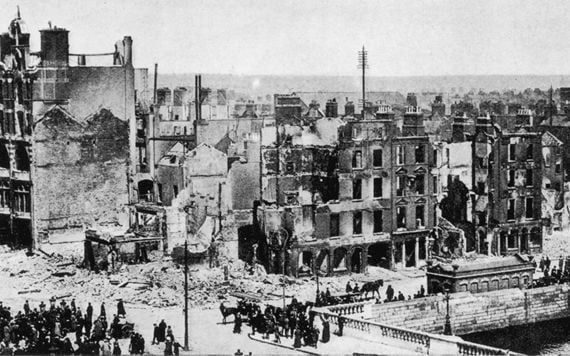A ceremony to mark the anniversary of the 1916 Easter Rising will take place outside the GPO, O’Connell Street, Dublin on Easter Sunday, March 31, 2024, commencing at noon.
The ceremony will be led by the President Michael D. Higgins, the Taoiseach, Leo Varadkar, T.D., and the Tánaiste and the Minister for Defence, Micheál Martin, T.D. Defence Forces’ Personnel, including a brass band, a pipe band and representatives of the Army, the Air Corps and the Naval Service will take part in the ceremony, which will conclude with an Air Corps fly past, weather permitting.
At noon, the National Flag on the GPO will be lowered, and the 1916 Proclamation will be read by an Officer from the Defence Forces.
The President will then lay a wreath to commemorate those who died in the 1916 Rising. A minute’s silence will be observed.
Members of the public are invited to attend the Ceremony and should be in position in the public viewing areas outside the GPO by 11.30 a.m . Viewing areas are located at the Clery’s side of O’Connell Street and at the south end of the G.P.O. An area has been reserved for wheelchair users. Large video screens will also be erected on either side of the GPO to display the Ceremony to the public. A Commemorative Programme will be distributed on the day.
The 1916 Easter Rising was a pivotal event in Irish history that took place in Dublin, Ireland, during Easter Week, April 24th to April 29th, 1916. It was an armed insurrection launched by Irish Republicans against British rule in Ireland with the aim of establishing an independent Irish Republic.
The Rising was organized by several nationalist groups, primarily the Irish Republican Brotherhood (IRB) and the Irish Volunteers, along with the smaller Irish Citizen Army. The rebels seized key locations in Dublin, including the General Post Office (GPO), and declared an Irish Republic. However, the rebellion faced significant challenges due to inadequate planning, limited support, and the overwhelming military power of the British forces.
After six days of fighting, during which much of central Dublin was destroyed, the leaders of the Rising surrendered to British forces. The British response was swift and harsh; many of the rebel leaders were executed by firing squad in the weeks following the Rising, and thousands of others were arrested and imprisoned.
While the Rising initially met with public disapproval due to the destruction it caused, the subsequent executions and imprisonment of the rebels led to a shift in public opinion.
The events of Easter Week 1916 ultimately contributed to the growing momentum for Irish independence, culminating in the War of Independence and the establishment of the Irish Free State in 1922.
The leaders of the Rising are commemorated as martyrs in Irish nationalist history, and the Easter Rising remains a significant event in the struggle for Irish independence.




Comments